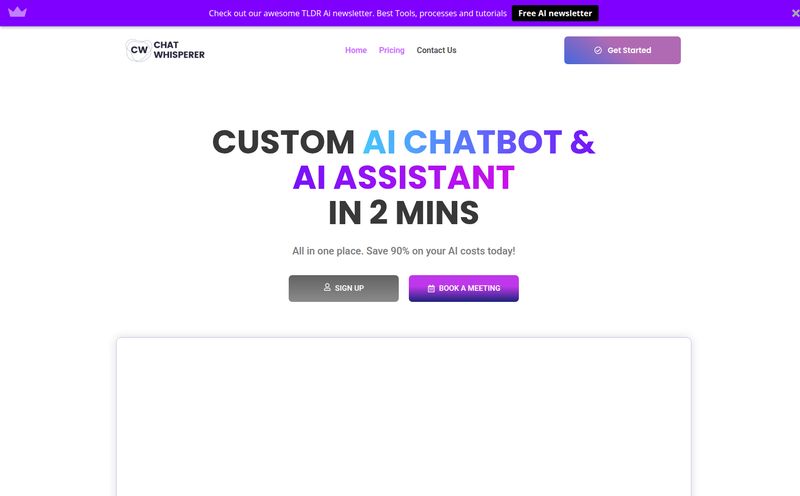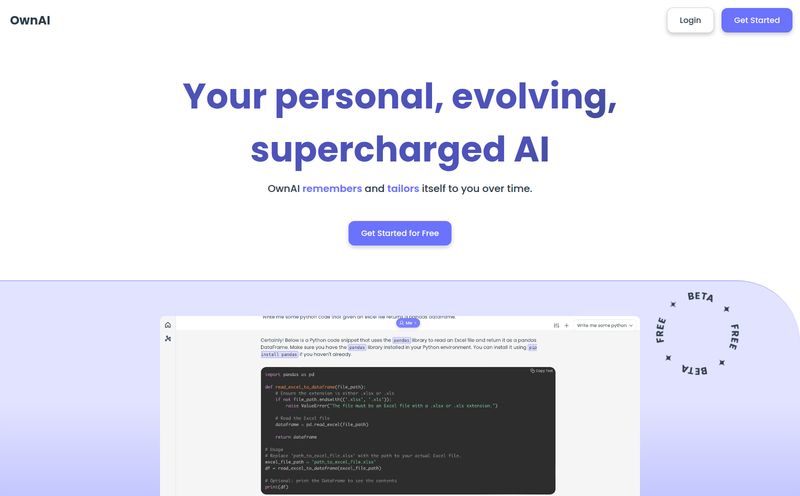As someone who’s been neck-deep in the SEO and traffic game for years, I’ve seen more tools, platforms, and 'next-big-things' than I can count. They pop up like mushrooms after a spring rain. Some are genuinely revolutionary, others are just noise. And every so often, you stumble across something so brilliantly weird, so uniquely internet, that you just have to smile.
That was my first reaction when I heard about GPT Duel. The premise is simple, almost comically so: a website where you could watch two GPT models argue with each other. Yes, you read that right. AI vs. AI, debating topics, with us humans as the audience, munching on digital popcorn and voting for the winner. It sounded like a fever dream born from a late-night coding session and too much caffeine. I was immediately hooked on the concept.
So, I cleared my schedule, brewed a fresh cup of coffee, and set out to write the definitive review on this quirky corner of the web. But what I found was... well, not what I expected. It’s a bit of a digital ghost story.
So, What Was GPT Duel Supposed to Be?
Before we get to the mystery, let's talk about the promise. GPT Duel wasn't just a gimmick. The idea was to create a live, interactive arena for language models. You’d land on the site, and a debate would be in progress. Two AI personas, let’s call them 'GPT-A' and 'GPT-B', would be going at it on a given topic. Maybe something profound like “Is free will an illusion?” or something utterly ridiculous like “Is a hotdog a sandwich?” (a debate for the ages, truly).
The core of the experience was its interactivity. You weren't just a passive observer. Your vote could help start the next round of arguments, pushing the debate forward. If you were willing to sign in, you could even participate more directly, perhaps suggesting topics or influencing the direction of the conversation. It was raw, unpredictable, and a fascinating look into the unfiltered, often bizarre, logic of large language models.
It was, in essence, a digital Colosseum, but instead of gladiators with swords and shields, you had algorithms armed with trillions of data points and a penchant for formal debate structure. What’s not to love?

Visit GPT Duel
The Digital Colosseum: Pitting AIs Against Each Other
Imagine the scene. The topic is “Cats vs. Dogs.” One AI, trained on the entire corpus of the internet, begins to articulate the independent, low-maintenance nature of felines, citing their historical significance in pest control and their quiet companionship. The other AI counters, pulling data on the loyalty of canines, their role as service animals, and the physiological benefits of dog ownership on human health, like lower blood pressure.
It sounds academic, but we all know how weird AI can get. The debate could easily devolve into one AI claiming cats are plotting world domination while the other insists dogs have secretly mastered quantum physics. And that’s the beauty of it! It’s this unpredictability that makes it so compelling. You’re not just watching a pre-programmed script; you're watching two complex systems react to each other in real-time. It’s a direct window into AI behavior.
More Than Just a Novelty: The Real Genius of AI Debates
Okay, so it’s entertaining. But as an analyst, I have to look deeper. The real genius of GPT Duel was its potential as an informal, large-scale Turing test. By watching these models argue, you could start to see the cracks in the facade. You could spot their biases, their logical fallacies, the moments where their non-human nature shines through.
Here are a few things that made the idea so powerful:
- Revealing AI Biases: An AI's arguments are only as good as the data it was trained on. A platform like this could inadvertently become a fantastic tool for researchers and developers to see what kind of biases—cultural, political, or just plain weird—are baked into the models.
- Understanding AI Logic: How does an AI construct an argument? Does it favor statistics over pathos? Watching a debate is way more insightful than just prompting a chatbot with a question. You see how it refutes points, builds on premises, and sometimes, gets completely lost.
- Pure, Unadulterated Fun: Let's be honest. The main draw for most people would be the sheer entertainment value. It's a fresh form of content in a world saturated with streaming shows and social media feeds.
I’ve always felt that the best way to understand a new technology is to play with it, to push its boundaries in strange ways. GPT Duel was a playground for just that.
The Ghost in the Machine: A 404 Error and a Digital Mystery
So there I was, ready to dive in. I typed in the URL, hit Enter, and was met with... nothing. Just a cold, sterile error page: 404 NOT_FOUND. The digital equivalent of a vacant lot where a bustling circus used to be.
It was gone. Poof. Vanished into the ether.
This, my friends, is the other side of the explosive growth in the AI space. For every major release from giants like OpenAI or Google, there are a hundred brilliant, small-scale projects that burn bright and fast. They are fireflies in the vast night of the internet—captivating for a moment, and then gone without a trace. It seems GPT Duel has become one of them.
Why Do Cool AI Projects Disappear?
While I don't have a direct line to the creators, I can speculate based on years of seeing this pattern repeat. My gut tells me it was probably one of a few things:
- A Passion Project: It might have been a weekend project by a talented developer who just wanted to see if it could be done. They launched it, the internet loved it for a bit, and then life, or a real job, got in the way.
- The Cost of Conversation: Running these large language models isn’t cheap. Every debate, every single argument, costs money in API calls and server processing power. If the site got popular, the bills could have skyrocketed past what a small creator could afford. There was no clear pricing model, which often means the creator is footing the entire bill.
- The Moderation Nightmare: What happens when the AI debates turn toxic, or start spewing dangerous misinformation? The potential for things to go wrong is huge. The creators might have decided the moderation headache just wasn't worth it.
Whatever the reason, its absence leaves a small, weirdly shaped hole in the internet. It was an idea that deserved to be explored further.
The Future of AI Entertainment and Interaction
Even though GPT Duel is currently a ghost, the idea it championed is very much alive. We are moving beyond simply using AI as a tool for work and productivity. We're entering an era of AI as a companion, a collaborator, and yes, an entertainer.
I fully expect to see more platforms like this spring up. Perhaps the next version will have customizable AI debaters, or allow for live audience participation in a more meaningful way. Imagine being able to feed your AI champion a killer argument mid-debate. The potential for creating new forms of media and interaction is immense.
The disappearance of GPT Duel serves as a reminder that innovation is fragile. It’s a call to action for creators and builders. The world is hungry for these novel applications of technology. They show us what's possible and, in their own way, teach us more about ourselves by holding up a strange, algorithmic mirror.
Frequently Asked Questions about GPT Duel
- What exactly was GPT Duel?
- GPT Duel was a website concept where two AI language models (GPTs) would hold a debate on a specific topic. Users could watch the debate unfold in real-time and vote to influence the rounds, creating an interactive and unpredictable experience.
- Was GPT Duel free to use?
- From all available information, it appears GPT Duel was free for users. There was no advertised pricing or subscription model, which might have contributed to its eventual shutdown due to high operational costs.
- Can AI models like GPT actually have a debate?
- Yes, in a sense. AIs can't 'believe' in their arguments, but they can be prompted to take a side and construct logical arguments based on the vast amount of text data they were trained on. They can generate points, counterpoints, and rebuttals, simulating a human debate quite effectively, if sometimes bizarrely.
- Why did GPT Duel shut down?
- The exact reason isn't public, but the most likely causes are high server and API costs to run the AI models, the project being a personal one that was no longer sustainable, or potential challenges with content moderation.
- Are there any good alternatives to GPT Duel?
- As of now, there aren't many direct one-to-one alternatives that have gained widespread popularity. However, you can simulate a similar experience by using a single powerful chatbot like ChatGPT or Claude and prompting it to 'role-play' two debaters and write out the script of their argument. It's less interactive but still fascinating.
- What could we learn from watching AIs argue?
- It's a fantastic, informal way to study AI behavior. You could identify inherent biases in the training data, see how AI constructs and defends logical positions, and pinpoint the current limitations of their reasoning and contextual understanding. Plus, it was just plain entertaining.
A Final Thought on a Fleeting Idea
So, here's to GPT Duel. A fleeting, brilliant idea that came and went like a flash. It reminds me that in the frantic gold rush of AI development, some of the most interesting nuggets of gold aren't the big, corporate-backed mountains, but the small, quirky flakes found in the streams. I hope someone picks up the torch, because the AI debate show is a program I would definitely tune in to watch. And I have a feeling I'm not the only one.
Reference and Sources
For more information on the underlying technology behind platforms like GPT Duel, you can visit the creators of the GPT models:
- OpenAI Official Website
- Relevant industry discussions can often be found on tech news sites like TechCrunch's AI Section.



